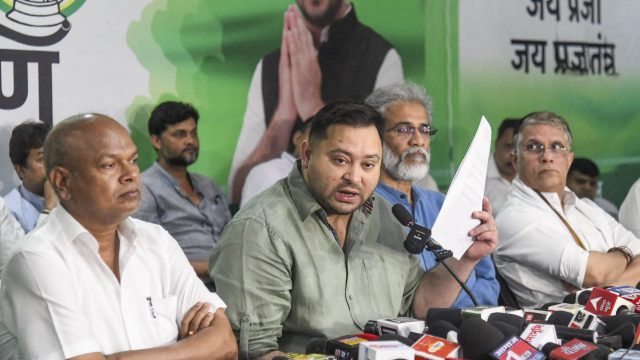
Amid the Opposition’s mounting concerns over the Election Commission (EC)’s “special intensive revision (SIR)” of the electoral rolls in Bihar just months ahead of the state Assembly elections, Rashtriya Janata Dal (RJD) leader Tejashwi Yadav has questioned the intent and timing of the exercise, asking the need for such a sweeping revision barely a year after the use of the same voter list in the 2024 Lok Sabha polls.
As per the EC’s directions, each existing elector will have to submit an individual enumeration form. Those added to the rolls after January 1, 2003 – the year of the last intensive revision – will additionally have to provide the proof of their citizenship.
Providing the rationale for its order, the EC said that “during the last 20 years, significant change in electoral roll has taken place due to additions and deletions on a large scale”, and “rapid urbanisation and frequent migration of population from one place to another… have become a regular trend”. This “special intensive revision” will eventually cover all states and Union Territories (UTs), the EC said.
Electors whose enumeration forms are not received by July 25 will be deleted from the roll. Deletions can be contested from August 1 to September 1. While the EC is yet to provide an exact number of electors who will be required to furnish proof of citizenship, about 3 crore electors have been added to electoral rolls in Bihar since 2003.
Tejashwi said the sudden move to scrap the existing voter rolls and require all citizens to apply afresh raises questions on the legitimacy of the elections that saw the BJP-led NDA come to power at the Centre.
The LoP described the timing and scale of the revision as “deeply suspicious and worrying”, and alleged that the exercise is being undertaken at the behest of the Centre with the BJP and its ally, Chief Minister Nitish Kumar-led Janata Dal (United), “panicking” ahead of the Assembly polls.
Tejashwi also questioned the feasibility of the exercise, claiming that the “last such revision took nearly two years”, while the current process is being attempted in a matter of weeks during the peak monsoon season, when 73% of Bihar is prone to floods. “Should government employees and citizens be saving lives from floods or collecting documents for the Election Commission?” he said.
The RJD leader further alleged that the new process “disproportionately” targets the poor, Dalits, Other Backward Classes (OBCs), minorities, and young voters, many of whom, he added, lack the documents now required for inclusion in the fresh rolls. Yadav claimed that even Aadhaar and MGNREGA identity cards were not being accepted as valid proof amid the current exercise to link Aadhaar with the voter list to prevent duplication.
Apart from documents such as passport, birth certificate, Scheduled Caste (SC) or Scheduled Tribe (ST) certificate, an extract of one’s parents’ names in Bihar’s electoral roll of Bihar as of January 1, 2003 “will be considered as a sufficient document in itself”, the EC said.
According to Tejashwi, nearly 4.8 crore voters under the age of 40 (those who registered to vote after 2003) will now be required to prove their citizenship or that of their parents within a one-month window. “Of these, about 4% – aged 39 to 40 (born before July 1, 1987) – will have to provide their own citizenship documents. Around 85% – voters aged 20 to 38 (those born between July 1, 1987 and December 2, 2004) – will be required to present at least one parent’s citizenship documents, while 11% – aged 18 to 20 – will have to submit citizenship documents for both parents,” he said.
Tejashwi cited government data showing that only a small fraction of the population possesses the documents now demanded by the EC. “According to the Government of India’s National Family Health Survey (NFHS)-3, only 2.8% of children born between 2001 and 2005 had a birth certificate. It is clear that among those born between 1965 and 1985, this number would be negligible… According to NFHS-2, only 10% to 13% of men aged 40 to 60 have completed high school… According to the India Human Development Survey (2011–12), about 20% of SCs and about 25% of OBCs possess a caste certificate. Among upper castes, this proportion is even lower, so on average, less than 20% of families have this certificate,” he said.
The LoP also pointed out that although the EC has listed 11 documents as valid for voter registration, only three – birth certificate, matriculation certificate, and caste certificate – were “relatively common”.
Tejashwi warned that the revision could disenfranchise a large number of electors, particularly among the most vulnerable groups, and called on the EC to reconsider the move. “Is this democracy, where long-time voters are forced to run from pillar to post to prove their identity?” he asked.
In Bihar, the RJD leads the Opposition Mahagathbandhan (grand alliance), which also comprises the Congress and the Left parties.
However, state JD(U) spokesperson Neeraj Kumar told The Indian Express, “This is routine work for the EC, and Opposition parties making political statements about it is very irresponsible… The revision of the electoral roll is beneficial for everyone, it’s an opportunity to include more people in the democratic process.”
State BJP spokesperson Manoj Sharma said, “The EC has demonstrated its capability by successfully conducting elections in such a vast country, setting a global example for large-scale democratic processes… However, for those parties that have so far depended on fake voters and bogus voting, this is a cause for concern. In Bihar, the EC has already put a stop to incidents of booth capturing, and now it is working to clamp down on bogus voting. So, raising questions about the Election Commission’s credibility is completely unwarranted.”